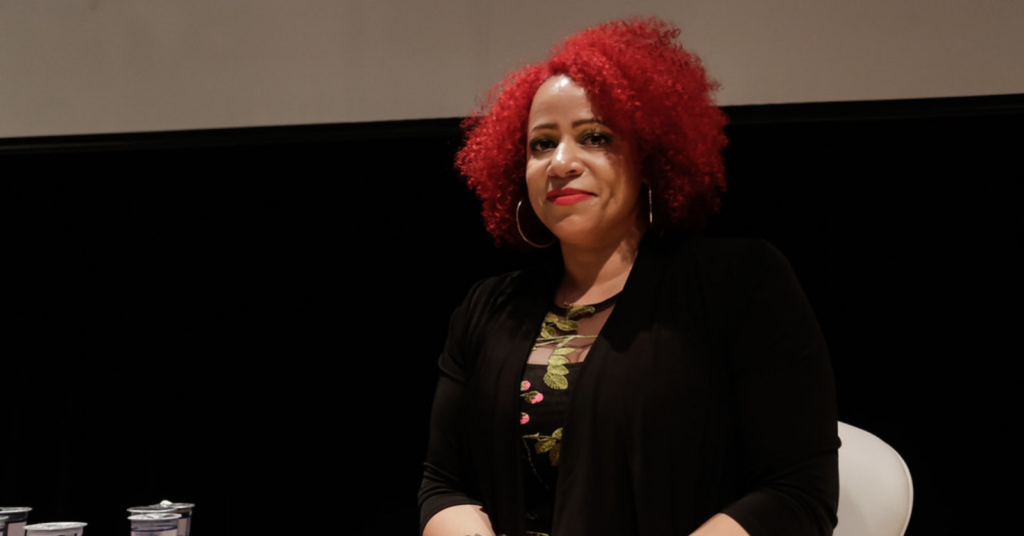History is written by the victors, and education about that history is usually determined that way, too.
And the truth comes out when that power is challenged.
In 2020, Nikole Hannah-Jones, an Iowa native and reporter for New York Times Magazine, won a Pulitzer Prize for commentary for her introductory essay for the 1619 Project, a deep, comprehensive account and investigation of the history and effects of slavery in the United States, starting with the arrival of the first slaves in the American colonies in 1619.
Her work launched a wave of education, conversation and analysis about African American history. The way it’s taught and the way people understand it.
The project has been turned into a podcast, a curriculum for schools and, coming soon, a docuseries featuring Hannah-Jones and Oprah.
And the Iowa legislature tried to ban the use of the curriculum in Iowa schools this session.
Thursday night, as part of the school’s Sussman Lecture series, Hannah-Jones joined the Harkin Institute at Drake University to talk about her work, the backlash to it and racial justice more generally.
She also explained how the history of slavery and racism can explain issues today, like the Republican push to make voting harder.
“As we all sat and waited for Black people in Black cities to determine the election, thanks to the electoral college…we’re waiting for Black people to save democracy. And when they do, then we have this whole effort to overturn those votes,” Hannah-Jones said.
Too often, she said, people learn that slavery ended with the Emancipation Proclamation, followed by years of discrimination that were ended by the Civil Rights Movement.
One of the goals of the 1619 Project was to fill in the gaps and to connect pieces of history to illustrate the truth by telling the stories of Black America and how slavery influences everything from music to the prison system to city planning.
“The very act of believing that we have to tell these stories and that, if we tell these stories, you might be able to change people’s minds is an act of hope,” Hannah-Jones said. “I don’t think America will ever make right what it’s done. But I know for a fact that it will never make right if we don’t acknowledge what’s been done.”
She rejected the idea of making people feel guilty or ashamed for things they didn’t do—a common argument made by people who don’t want to confront the realities of systemic racism. Instead, she said the wrongs must be acknowledged and addressed, like one would with an argument with a friend or coworker.
“We do have to acknowledge that we have inherited these things whether or not we did them,” Hannah-Jones said. “And what we have to own is what we do with what we have inherited.”
For too long, America has tried to move on without addressing what happened.
Hannah-Jones first heard about the year 1619, and its significance, in an African-American studies class in her Waterloo high school.
She also joined the high school’s newspaper with the mission of telling stories about her fellow Black classmates and their experiences.
Hannah-Jones said she’s always been interested in the intersection of racial inequality and policies for housing and education.
When she got started professionally, she covered the education beat and had an up-close view of how majority-Black schools were treated for not meeting testing standards. And then how they weren’t given resources to improve.
Hannah-Jones said she set out to show how these issues are interconnected and can be traced back to the fundamental inequality Black people have always experienced in America.
“We as Americans believe the past is important in the way that we want it to be important,” she said. “So we clearly believe the Declaration of Independence is important. We clearly think that the Constitution still shapes our society, that our founding ideas still shape our society. But when it comes to slavery and its legacy, we really want to pretend that at Emancipation slavery no longer had an impact on our country.”
And that’s why the 1619 Project faced so much backlash, especially from the right-wing—spearheaded by right-wing media and perpetuated by politicians.
Including some of Iowa’s.
During this year’s Iowa legislative session, Republicans tried to pass House File 222, managed by Skyler Wheeler. The bill would ban public schools and colleges from using the 1619 Project in class, and would remove state aid from institutions that did.
The bill died in committee, but another bill prohibiting the discussion of issues like implicit bias and systemic racism or sexism in diversity trainings made it farther.
Hannah-Jones said she was disappointed to see that from her home state, but she was heartened by the people who pushed back against the bill.
Overall, she said she didn’t expect the amount of backlash the 1619 Project has received, especially not the coordinated attacks from right-wing figures, but she feels good about unsettling the way people think about these issues.
“I also felt really, a deep sense of pride that this idea, the ideas put forth in this project, could be so frightening to powerful people,” Hannah-Jones said. “This fight is about power. It’s never been about historical accuracy…it’s been about a selection of facts to create a common understanding that often is geared toward affirming this idea of American Exceptionalism. And that’s about power.”
Photo by: Alice Vergueiro/Abraji
